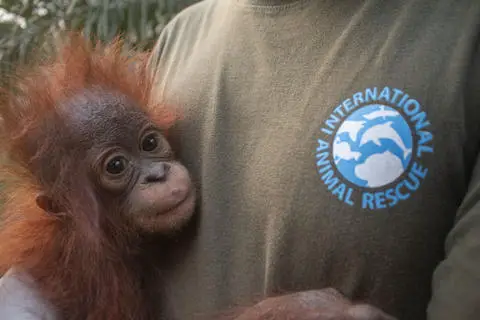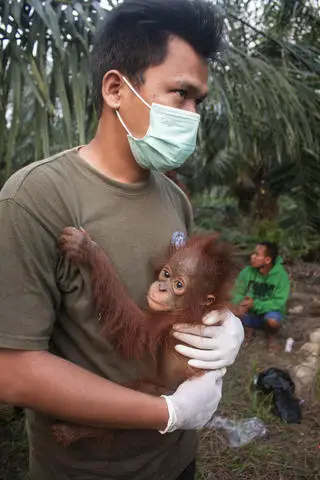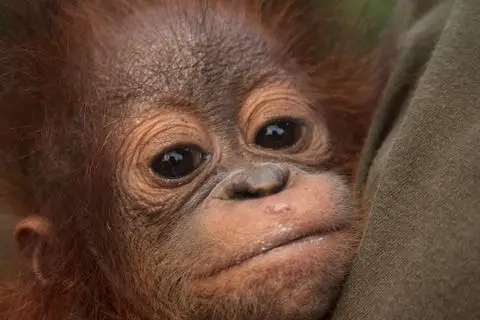This Baby Orangutan Was Left To Die In A Palm Oil Plantation, Then Volunteers Stepped In
Tags: opinion

By Amanda Froelich,
Have you heard of the ingredient palm oil? It might be used in dozens of household products, but it is responsible for devastating the environment and the habitats of hundreds of species, specifically in Indonesia. Unfortunately, the majority of people are unaware of this fact. It is for this reason that stories, such as the one that follows, need to be shared.
Recently, a tiny baby orangutan was rescued by a team from International Animal Rescue (IAR) and members of the Natural Resources Conservation Center. The group traveled to a palm oil plantation in Tanjung Pasar Village in Ketapang District, where workers were waiting to hand over the baby.
IAR reports that a worker named Rahman found the tiny ape crying alone in the bushes. After reporting the discovery to the plantation manager, he was instructed to leave the orangutan alone — just in case the mother returned. The following day, Rahman found the tiny ape in the same spot, once again alone. So, he finally reported the orphaned orangutan to IAR.
Immediately, a team set off to rescue the baby ape. On arrival, an IAR veterinarian examined the little guy and determined that he was suffering from mild dehydration. The vet also estimated that the orangutan was less than one year old.
 After naming the ape Rahman, after the man who found him, IAR returned to the Orangutan Rescue and Rehabilitation Centre in Ketapang. There, the orphaned ape received an additional examination, treatment, and care.
After naming the ape Rahman, after the man who found him, IAR returned to the Orangutan Rescue and Rehabilitation Centre in Ketapang. There, the orphaned ape received an additional examination, treatment, and care.
“It’s a tragedy to find a baby orangutan without its mother, alone, vulnerable and distressed. Rahman should have been in his mother’s care for the next six or seven years of his life,” said IAR CEO, Alan Knight OBE. “Instead, she is nowhere to be found. It’s highly likely that she has been killed as yet another victim of hunters or agricultural workers protecting their crops. Thankfully he is in safe hands now and will be given expert treatment and care at our centre which is currently home to 109 rescued orangutans.”
At the center, Rahman will undergo a rehabilitation process to prepare him for re-emergence back into the wild. The ape will need to learn the skills necessary to survive: climbing, foraging for food, and making nests.
Sadtata Noor, Head of the BKSDA West Kalimantan, said: “Land clearing activities have made the orangutans’ habitat fragmented, making it difficult for them to obtain food. Consequently, many orangutans enter the areas of human activities. There needs to be firm agreement and cooperation between the government, the local community and the private sector if wildlife preservation is to be maintained.”
“Eighty per cent of the orangutan population is living outside conservation areas, in plantations and production forests,” Tantyo Bangun, Head of IAR’s Indonesia Programme, added. “It is vital for all parties to participate so that the orangutan population can be managed properly by protecting the remaining forests and creating wildlife corridors, so that in future baby orangutans are spared from suffering the same fate as Rahman. “

Over 5000 people have downloaded our free ebook “Growth Hacking Tips And Rituals For Optimal Living” CLICK HERE to get your free copy now
Credits: Internationalanimalrescue.org

Leave Comment: